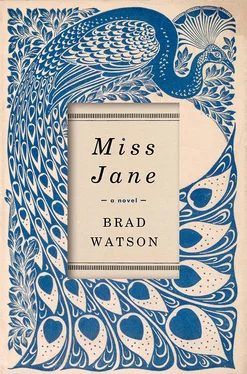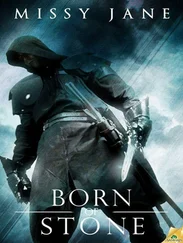He went into the house and came out, hobbling just a little, handed her the drink. A cock flew by so close it almost startled her into spilling bourbon onto her blouse.
“Good lord!” she said.
The cock landed on a tree limb at the edge of the yard with a honking sound. Dr. Thompson laughed, sat down.
“You know,” he said then, “you being startled like that reminds me. When I was a boy, for a while when I was small, I was afraid of things. I don’t know why. But I was afraid of just about everything. I can’t even say exactly what, just generally afraid. My parents were worried. I was an only child. I may have been adopted, but if I was they never told me. I don’t much favor either one of them, never did. Anyway, we lived on the outskirts of Birmingham, Alabama, in a big house, with woods nearby, like these. My father was a surgeon and I think he wanted me to follow him in that. Anyway, at some point I grew curious about those woods and gathered up the courage to go into them by myself. At first I was afraid of every sound and every little motion from this critter or that. Scared of the swoop of a bird, which would come out of nowhere, it seemed, not like when it happened in our yard. But gradually, as I did overcome my fear, and was able to sit quietly in a little clearing, or in the crook of a small tree, or beside a creek or whatever, I started to study the animals — mostly squirrels and chipmunks and armadillos, every now and then a fox or raccoon — and the birds. Study their habits best I could, I mean. And then I became mostly fascinated with the birds. I became so fascinated with them that I completely forgot about my fears. I just about forgot everything else that summer. I must have been eight or nine, I don’t know. Maybe ten years. I’d had some kind of elementary science at school, I think. And my father gave me a copy of Audubon’s book, and a BB gun, one of the first Daisys, I think, and some old surgical tools, and helped me in my crude efforts at dissection. I was fascinated by how these birds’ bodies were put together. How complex it was. I would pluck their feathers before dissection and study how the parts of their bodies fit into one another, before I removed the skin and then after. I would carefully skin them. I never did skin them with feathers for stuffing. I wasn’t interested in that. I made drawings.” He laughed at himself. “I decided I wanted to become a zoologist, pure science, much to my father’s disappointment. He thought I would grow out of it, though, and I guess I did.
“In any case, there was a bit of a cooling of my interest, as I got older. And then I met Lett and medicine seemed like the pragmatic choice. And she wanted to live down here.”
Their glasses were empty and they went quiet, the doctor seeming lost in thought.
“You’re kind of talky, Ed,” she said. “Have you got into your medicine again?”
He mocked her expression. “Maybe a bit.”
“I should go on,” she said. “I don’t like to drive in the dark.”
One of the peacocks called loudly from the trees, another called back, and the others made a contest out of trying to join in, and then after a raucous bit of that all was quiet. Even the songbirds calmed down.
“The birds are going to sleep for a while,” the doctor said. “Roost in the trees down there. Maybe you should give it up and roost in the guest room here tonight.”
She thought about it.
“I might.”
“Good.” Then he said, “There’s just enough light left. Let me show you something. Come on.”
They walked to the edge of the yard, around Hattie’s cabin, then onto a trail into the woods, moving a bit slowly given his stiffness and her town shoes. The woods were pristine, had never been cut. She wished she had walked with him here before and couldn’t imagine why she hadn’t. The path declined through thick brush and then opened out into an expanse of mostly pine, sweet gum, and birch trees. The trees’ high, broad canopy had kept down most of the undergrowth, so that you could see almost the length of this little narrow forest. And there in the relative clearing, standing very still and watching them as if they had interrupted a party, were dozens of peafowl. For a moment it took her breath. Several of the cocks took steps toward them, stopped, and seemed to shudder throughout their bodies, and up went their long tails, fluttering, shimmering even in what little light was left in the day in these shadows.
“My god,” she said, “they’ve gone wild.”
“They were never tame,” the doctor said. “Not really.”
He knelt carefully down and brushed away leaves and pine needles and scooped up a small handful of dusty earth.
“This is what you do with my ashes when I’m gone,” he said, and tossed it into the air toward the birds, who seemed to come out of their trance at that. Some took flight toward denser foliage, and mixed in with the blustering of their wings made sounds like the little honk of a horn and a barking sound, almost like a wild turkey. Some squawked like a quieter imitation of a crank being turned to start an old car.
“You know one of the most interesting things about birds, Janie? It’s that most of them, all but ducks and geese and a few others — but all songbirds—” then he stopped himself, shook his head. “I may be a little loose-lipped with my bourbon and, uh — it’s brought out the awkward scientist in me.”
“No, tell me what you were going to say.”
He looked at her sideways.
“All right, then. I was going to say they don’t have obvious genitalia. It’s mostly on the inside. The males and the females have this little puckering down there, called the cloaca , and when they’re ready to mate the cloaca swell up, and they simply press their little puckerings together and the male’s sperm finds the female’s eggs and, voilà, baby birds. Do you know what they nicknamed this kind of mating, with birds? They call it a cloacal kiss. Now, don’t you think that’s just kind of endearing?”
She looked at his long, bushy-browed, kindly face in the fading light.
“I do,” she said. “Maybe I’m part bird.”
The doctor had a good little quiet laugh at that.
In a moment, she said, “How about the peacocks?”
“They’re that way, too.”
She could see them, becoming silhouettes as the light became dimmer in her vision, here and there in their roosts, settling in. She looked back toward the trail.
“It’s getting dark.”
The doctor said, “All you have to do is pretend that you can see in the dark, and then you can.”
She made a sound.
“No, really. Just relax your eyes. There. Like that. You see what you can see? You see the trail? You look for what is not the trail. See it?”
“I think I do.”
“All right, then,” he said. “That’s all you need.”
“Okay, then.”
He hesitated, then said, “You once asked me why I got those first birds.”
“I remember. You were lonesome.”
“I was. But really I got them simply because they’re beautiful, they’re strange. People don’t know what to make of them. I liked that. I suppose their role in nature is to help control the populations of the things they eat. They’re good regulators. And to feed the occasional fox or coyote, no doubt. But I like to think they really exist just because they are oddly beautiful. And are killed out of jealous envy. I like to think they enjoy the fact that we think they’re beautiful. I like to think they’re vain. I like to think that they think we think they’re gods, and that the reason we gaze at them in such wonder is that we are worshipping them. Look at them in there. Like shadows, spirits.”
He turned to her, looking unabashedly happy, his face a pale moon in the darkening woods.
Читать дальше












